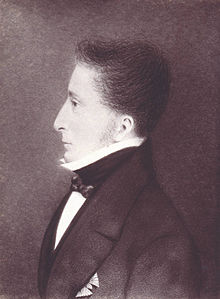Sir John Eardley-Wilmot, 1st Baronet
| Sir John Eardley-Wilmot, Bt | |
|---|---|
 |
|
| 6th Lieutenant Governor of Van Diemen's Land | |
|
In office 21 August 1843 – 13 October 1846 |
|
| Preceded by | John Franklin |
| Succeeded by | William Denison |
| Personal details | |
| Born |
21 February 1783 London, England, United Kingdom |
| Died | 3 February 1847 (aged 63) Hobart, Van Diemen's Land |
| Spouse(s) | Elizabeth Emma Parry & Elizabeth Chester |
Sir John Eardley Eardley-Wilmot, 1st Baronet (21 February 1783 – 3 February 1847) was a politician in the United Kingdom who served as Member of Parliament (MP) for North Warwickshire and then as Lieutenant-Governor of Van Diemen's Land (later called Tasmania).
Eardley-Wilmot was the son of John Eardley Wilmot (1748–1815), barrister, and grandson of Sir John Eardley Wilmot, Chief Justice of the Common Pleas. He was educated at Harrow School, called to the bar in 1806, appointed High Sheriff of Warwickshire in 1818 or 1819 and created a baronet in 1821 and in 1822 published An Abridgment of Blackstone's Commentaries. This was followed in 1827 by A Letter to the Magistrates of England on the Increase of Crime, by Sir Eardley Eardley-Wilmot, Bart. F.R.S., F.L.S. and F.S.A. He was a member of the House of Commons, representing North Warwickshire from 1832 until March 1843. In 1840 he attended an international meeting on 12 June 1840 on anti-slavery. A large painting in the National Portrait Gallery records that event and Eardley-Wilmot is shown with Dr Stephen Lushington, a judge, behind the main speaker.
Eardley-Wilmot was appointed lieutenant-governor of Van Diemen's Land, and arrived at Hobart on 17 August. He probably owed his position to the interest he had taken in the subject of crime; his plea that prisoners under the age of 21 should be segregated and a special endeavour made to reform them suggests that he was in advance of his period.
...
Wikipedia
